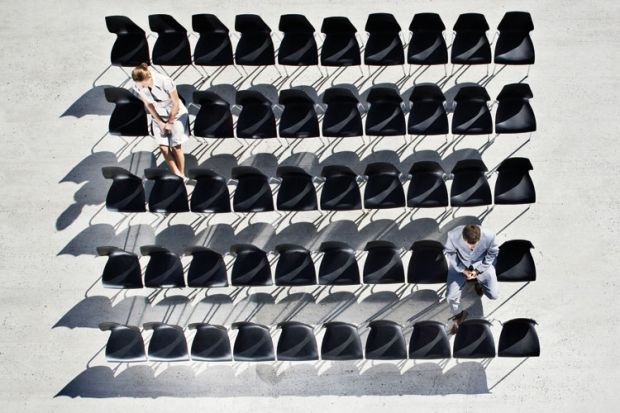Source: Alamy
‘Sham students’: Student Loans Company meeting heard of ‘suspicions’ over recruitment and attendance at some private providers
The government body in charge of the student loans system has discussed “counter-fraud” investigations into some for-profit colleges to examine “suspicions” about whether their students are genuine and turning up to classes.
Minutes from a Student Loans Company board meeting also suggest that there was confusion between the organisation and the Department for Business, Innovation and Skills as to who leads investigations into private colleges.
And it has emerged that BIS, which is reviewing all designations for public funding for private providers, has written to 40 private colleges to tell them their courses will no longer be eligible for public funding, a move likely to raise questions about how the department made the courses eligible in the first instance.
Nearly £1 billion in publicly funded loans and grants will be paid to students at private providers next year, according to government figures, following an explosion in sub-degree Higher National Certificate and Higher National Diploma course provision. After revelations about alleged misuse of public funding by some for-profit colleges, the Public Accounts Committee and the National Audit Office are to hold an inquiry.
Minutes from an SLC board meeting in December 2013 state that the board received an “update on counter fraud, and recognised that this was an area of increasing focus and concern”.
The board discussion “noted that further clarity was required on the respective roles and responsibilities of BIS and the SLC Board and Accounting Officer in this area”, and also on communications with any “HEI [higher education institution] that is connected with an on-going investigation or where there are suspicions regarding student recruitment and attendance”.
Matthew Hilton, director of higher education in BIS, who joined the discussion via phone, “noted that he understood that this matter had been resolved”. However, Mick Laverty, the SLC chief executive, replied that the SLC had followed up on previous exchanges with BIS and written to the department in late October “although as yet no response had been received”.
Liam Byrne, Labour’s shadow universities, science and skills minister, said: “When the SLC starts using terms like ‘fraud’, it’s clearer than ever that this Tory-led government’s ideological onslaught on higher education has failed, placing millions of pounds of taxpayers’ money at risk.”
The SLC refused a Freedom of Information request from Times Higher Education to provide copies of the counter-fraud update and the emails to BIS. However, it did confirm that the counter-fraud update referred to “specific designation concerns with regards to Ice Academy and outlines the process for investigating private providers”.
In January, BIS put out a press release stating that for-profit Ice Academy – whose students claimed £6.6 million from the SLC in 2012-13 – “had supplied misleading information to the SLC about where some of its students were studying”, leading to some wrongly gaining access to public-backed loans.
Asked if BIS had ever been in contact with the police regarding Leicester-based Ice Academy, the department’s spokesman said: “It would be inappropriate to comment on whether the department has been in contact with the police in any particular instance.”
Asked whether it had investigated Ice Academy, a Leicestershire police spokeswoman said a complaint of “financial irregularities at an educational institution” had been received in February 2013. But it was decided that there was “insufficient evidence” to mount a criminal investigation.
An Ice Academy spokesman said the college has “worked extremely hard with BIS to reconcile designation issues” and received a letter from the department in January, “stating that the matter is resolved and that no further action was to be taken. We have never been contacted by the police and have no knowledge of any allegations against Ice Academy in any way whatsoever.”
A BIS spokesman said the department “is in the process of reviewing all existing specifically designated courses at alternative providers”.
He added: “This process is on-going but to date we have written to 40 providers to end the specific designation of their courses. These providers either did not apply to have their designations reissued under the new system, did not satisfy the requirements to apply, or were no longer delivering eligible courses.”
The spokesman would not identify the 40 colleges, but said they did not include 23 private colleges who had SLC funding suspended in November.
An SLC spokeswoman said that BIS is “responsible for leading any investigation that looks at whether alternative providers are complying with the terms of their designation”.
Sally Hunt, the University and College Union general secretary, said the government had created “a situation where agencies don’t appear to know how to regulate and are bandying terms like fraud around in connection with for-profit companies”.

